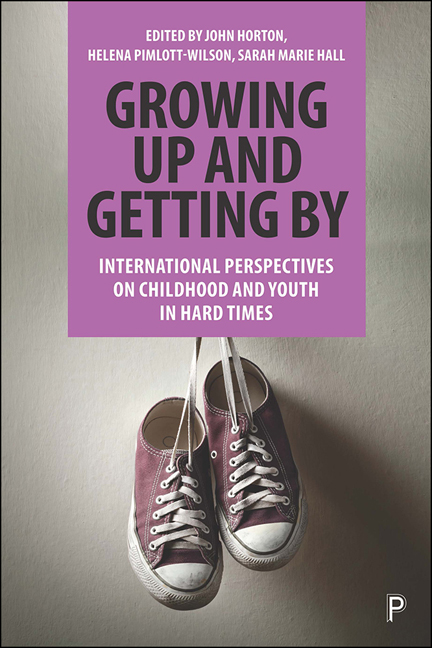12 - The undeserving poor and the happy poor: interrelations between the politics of global charity and austerity for young people in Britain
Published online by Cambridge University Press: 18 December 2021
Summary
Introduction
This chapter explores how the politics of popular charity in the global South interact with the politics of austerity in young people's lives in the global North. The chapter draws out the parallels and interrelations between these two arenas through examining international volunteering trips to sub-Saharan Africa which engaged young people from low-income backgrounds in the UK. In such trips, idealised imaginaries of helping ‘the grateful, happy poor’ of the global South sit alongside anxieties about young people growing up in urban neighbourhoods in the UK as potential members of an ‘ungrateful’ and ‘undeserving poor’ who should become more responsible for themselves. Popular ‘humanitarian’ imaginaries which frame ‘real poverty’ as absolute material need, delegitimises relative poverty and inequality in Britain and mesh with the pressure on young people to adopt aspirational, responsible subjectivities under neoliberal austerity. Young people are also left with contradictory messages around material wealth as both something to be eschewed and something which defines their value. Many young people internalised the ‘lessons’ of the trips to become more grateful and motivated, though some resist narrow ideas around poverty and responsibility, and assert the challenges of classed stigma and poverty in their lives. Overall, the chapter raises critical questions about how the politics of neoliberal subjectification and the ‘responsibilisation of poverty’ occur and are normalised across diverse sites which stretch beyond the nation-state and ‘the local’.
Barefoot kids and too-many-trainers kids
I talked about shoes – or the lack of shoes – surprisingly frequently during my research on young people's participation in international volunteering (see Cheung Judge, 2016). The research was specifically focused on short volunteering trips from the UK to sub-Saharan Africa which engaged young people from low-income urban neighbourhoods, rather than privileged participants. As young people talked about their experiences of volunteering, images of barefoot children in Kenya and Zimbabwe (the trip destinations), peppered the interviews. Anecdotes about children's lack of shoes were used to illustrate sadness and shock at witnessing deep material poverty, as well as admiration and amazement at the laughter and play which existed despite such poverty. But strikingly, in the UK volunteers’ accounts, the barefoot children also had a mirror image – British young people with too many shoes – too many pairs of trainers, to be precise.
- Type
- Chapter
- Information
- Growing Up and Getting By , pp. 231 - 248Publisher: Bristol University PressPrint publication year: 2021



